|
|
|
|
|
|
|
|
|
Award Number and Duration |
|
|
|
DOE DE-SC0021015 |
|
|
|
PI and Point of Contact |
|
|
|
Bei Wang Phillips (Publish Under Bei Wang) |
|
|
|
Overview |
|
|
|
We are experiencing an information overload from streams of data that arise from scientific instruments and simulations. For example, material scientists use molecular dynamics (MD) simulations to study how fluids (such as gas, oil, and water) interact with heterogeneous porous solids (such as ceramics, cement, and rock) to improve transport phenomena within porous materials, which play critical roles in our energy sector. Such simulations generate large, time-varying, and complex forms of data under different physical and chemical conditions. Keeping track of interesting phenomena and applying appropriate actions (such as storage, analysis, and visualization) while the simulation is running is necessary but challenging. To address this challenge, the goal is no longer to capture and store observations or simulation in detail, but rather to process data efficiently and approximately in order to create a summary - a sketch - which allows queries over large volumes of data to be answered quickly. |
|
|
|
Publications and Manuscripts |
|
|
|
Papers marked with * use alphabetic ordering of authors. |
| Year 5 (2024 - 2025) | |
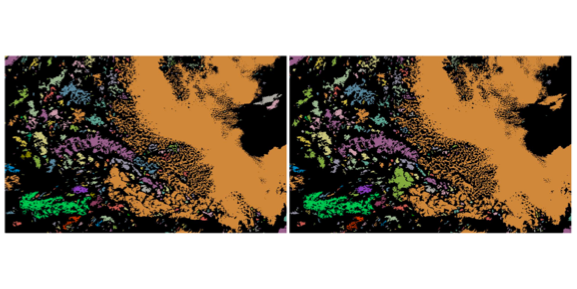
|
Tracking Low-Level Cloud Systems with Topology.
Mingzhe Li, Dwaipayan Chatterjee, Franziska Glassmeier, Fabian Senf, Bei Wang. Manuscript, 2025. |
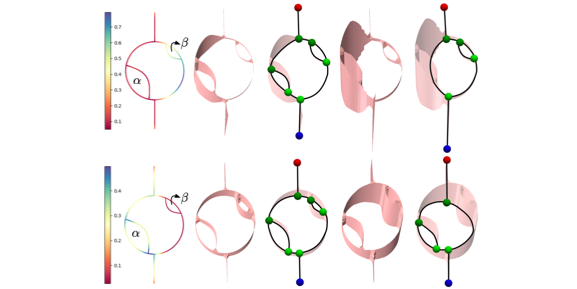
|
 Measure-Theoretic Reeb Graphs and Reeb Spaces.
Measure-Theoretic Reeb Graphs and Reeb Spaces.
Qingsong Wang, Guanqun Ma, Raghavendra Sridharamurthy, Bei Wang. Discrete & Computational Geometry (DCG), minor revision, 2025. arXiv:2401.06748. |
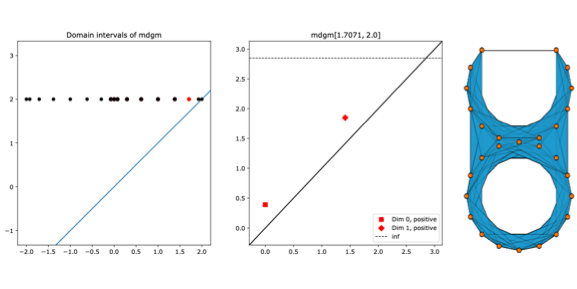
|
 Meta-diagrams for 2-parameter persistence.
Nate Clause, Tamal K. Dey, Facundo Mémoli, Bei Wang.
Meta-diagrams for 2-parameter persistence.
Nate Clause, Tamal K. Dey, Facundo Mémoli, Bei Wang.
Discrete & Computational Geometry (DCG), accepted, 2025. |
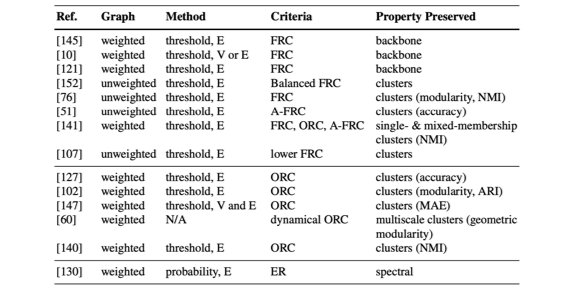
|
 Finding the Cores of Higher Graphs Using Geometric and Topological Means: A Survey.
Inés García-Redondo, Claudia Landi, Sarah Percival, Anda Skeja, Bei Wang, Ling Zhou.
Finding the Cores of Higher Graphs Using Geometric and Topological Means: A Survey.
Inés García-Redondo, Claudia Landi, Sarah Percival, Anda Skeja, Bei Wang, Ling Zhou.
Research in Computational Topology 3, Association for Women in Mathematics Series, Springer, Cham, accepted, 2025. |
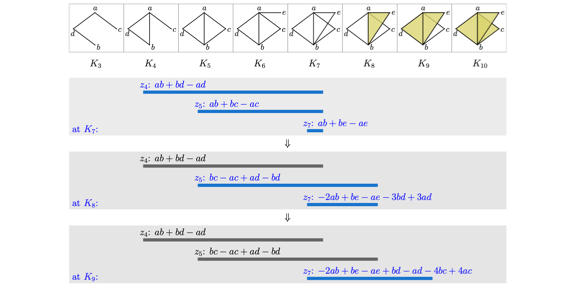
|
 Tracking the Persistence of Harmonic Chains: Barcode and
Stability.
Tracking the Persistence of Harmonic Chains: Barcode and
Stability.
Tao Hou, Salman Parsa, Bei Wang. International Symposium on Computational Geometry (SOCG), 2025. arXiv:2412.15419. |
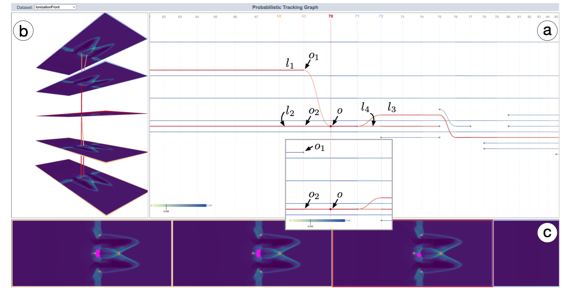
|
 Flexible and Probabilistic Topology Tracking with Partial Optimal Transport.
Flexible and Probabilistic Topology Tracking with Partial Optimal Transport.
Mingzhe Li, Xinyuan Yan, Lin Yan, Tom Needham, Bei Wang. IEEE Transactions on Visualization and Computer Graphics, 2025. DOI: 10.1109/TVCG.2025.3561300 arXiv:2302.02895. |
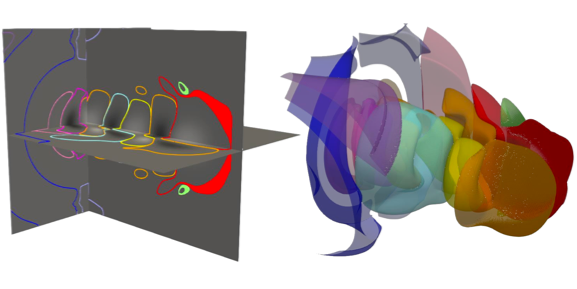
|
 Distributed Augmentation, Hypersweeps, and Branch Decomposition of Contour Trees for Scientific Exploration.
Distributed Augmentation, Hypersweeps, and Branch Decomposition of Contour Trees for Scientific Exploration.
Mingzhe Li, Hamish Carr, Oliver Rubel, Bei Wang, Gunther H. Weber. IEEE Visualization Conference (IEEE VIS), 2024. IEEE Transactions on Visualization and Computer Graphics, 31(1), pages 152-162, 2025. DOI:10.1109/TVCG.2024.3456322 arXiv:2408.04836 |
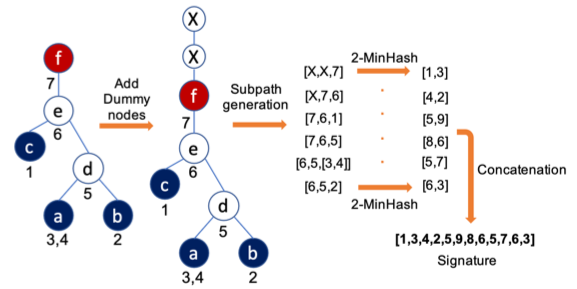
|
 Fast Comparative Analysis of Merge Trees Using Locality-Sensitive Hashing.
Fast Comparative Analysis of Merge Trees Using Locality-Sensitive Hashing.
Weiran Lyu, Raghavendra Sridharamurthy, Jeff M. Phillips, Bei Wang. IEEE Visualization Conference (IEEE VIS), 2024. IEEE Transactions on Visualization and Computer Graphics, 31(1), pages 141-151, 2025. DOI:10.1109/TVCG.2024.3456383 arXiv:2409.08519 |
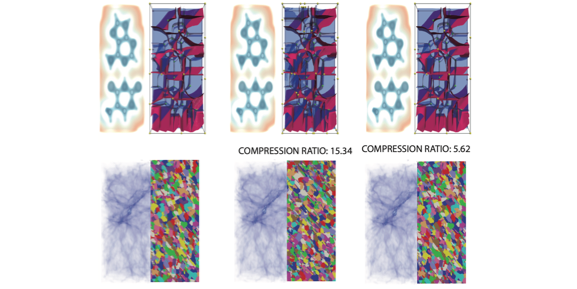
|
 MSz: An Efficient Parallel Algorithm for Correcting Morse-Smale Segmentations in Error-Bounded Lossy Compressors.
MSz: An Efficient Parallel Algorithm for Correcting Morse-Smale Segmentations in Error-Bounded Lossy Compressors.
Yuxiao Li, Xin Liang, Bei Wang, Yongfeng Qiu, Lin Yan, Hanqi Guo. IEEE Visualization Conference (IEEE VIS), 2024. IEEE Transactions on Visualization and Computer Graphics, 31(1), pages 130-140, 2025. DOI:10.1109/TVCG.2024.3456337 Supplement 1. Supplement 2: Detailed figures from Figure 7 and Figure 8 in the main paper. arXiv:2406.09423 |
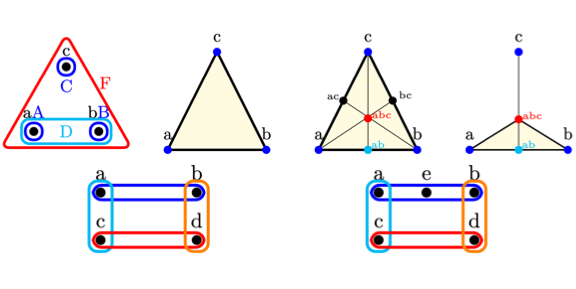
|
 A Survey of Simplicial, Relative, and Chain Complex Homology Theories for Hypergraphs.
A Survey of Simplicial, Relative, and Chain Complex Homology Theories for Hypergraphs.
Ellen Gasparovic, Emilie Purvine, Radmila Sazdanovic, Bei Wang, Yusu Wang, Lori Ziegelmeier. Manuscript, 2024. arXiv:2409.18310 |
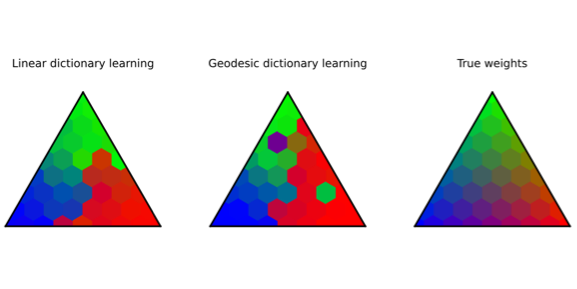
|
 Geometry of the Space of Partitioned Networks: A Unified Theoretical and Computational Framework.
Geometry of the Space of Partitioned Networks: A Unified Theoretical and Computational Framework.
Stephen Y Zhang, Fangfei Lan, Youjia Zhou, Agnese Barbensi, Michael P H Stumpf, Bei Wang, Tom Needham. Manuscript, 2024. arXiv:2409.06302 |
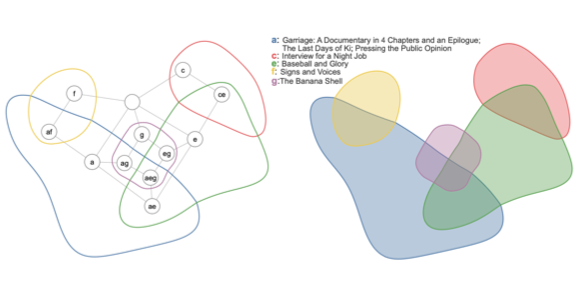
|
 EulerMerge: Simplifying Euler Diagrams Through Set Merges.
EulerMerge: Simplifying Euler Diagrams Through Set Merges.
Xinyuan Yan, Peter Rodgers, Peter Rottmann, Daniel Archambault, Jan-Henrik Haunert, Bei Wang. Proceedings of the 14th International Conference on the Theory and Application of Diagrams (DIAGRAMS), 2024. DOI:10.1007/978-3-031-71291-3_16 |
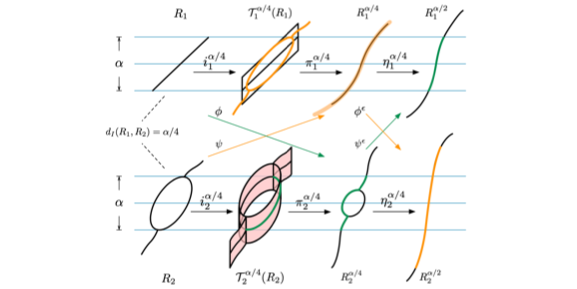
|
 Labeled Interleaving Distance for Reeb Graphs.
Labeled Interleaving Distance for Reeb Graphs.
Fangfei Lan, Salman Parsa, Bei Wang. Journal of Applied and Computational Topology, 8, pages 2367-2399, 2024. DOI:10.1007/s41468-024-00193-6 arXiv:2306.01186 |
| Year 4 (2023 - 2024) | |
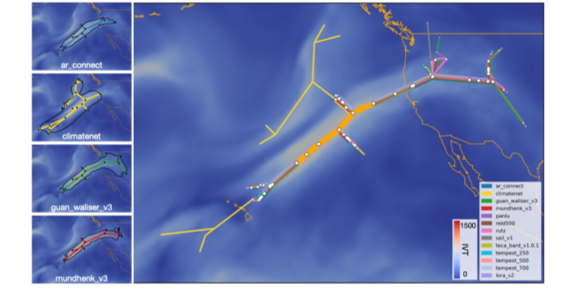
|
 Topological Characterization and Uncertainty Visualization of Atmospheric Rivers.
Topological Characterization and Uncertainty Visualization of Atmospheric Rivers.
Fangfei Lan, Brandi Gamelin, Lin Yan, Jiali Wang, Bei Wang, Hanqi Guo. Eurographics Conference on Visualization (EuroVis), 2024. Computer Graphics Forum, 43(3), e15084, 2024. DOI:10.1111/cgf.15084 |
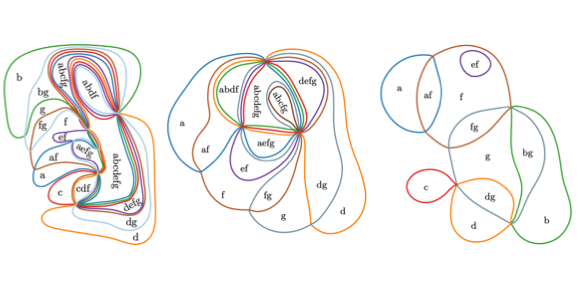
|
 Generating Euler Diagrams Through Combinatorial Optimization.
Generating Euler Diagrams Through Combinatorial Optimization.
Peter Rottmann, Peter Rodgers, Xinyuan Yan, Daniel Archambault, Bei Wang, Jan-Henrik Haunert. Eurographics Conference on Visualization (EuroVis), 2024. Computer Graphics Forum, 43(3), e15089, 2024. DOI:10.1111/cgf.15089 |
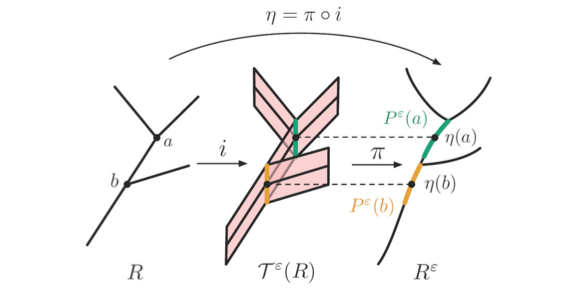
|
 Labeled Interleaving Distance for Reeb Graphs (Abstract).
Labeled Interleaving Distance for Reeb Graphs (Abstract).
Fangfei Lan, Salman Parsa, Bei Wang. International Symposium on Computational Geometry (SOCG) Young Researcher Forum (YRF), 2024. |
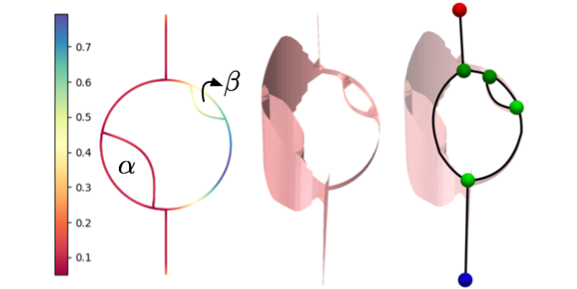
|
 Measure-Theoretic Reeb Graphs and Reeb Spaces.
Measure-Theoretic Reeb Graphs and Reeb Spaces.
Qingsong Wang, Guanqun Ma, Raghavendra Sridharamurthy, Bei Wang. International Symposium on Computational Geometry (SOCG), 2024. DOI:10.4230/LIPIcs.SoCG.2024.80 arXiv:2401.06748. |
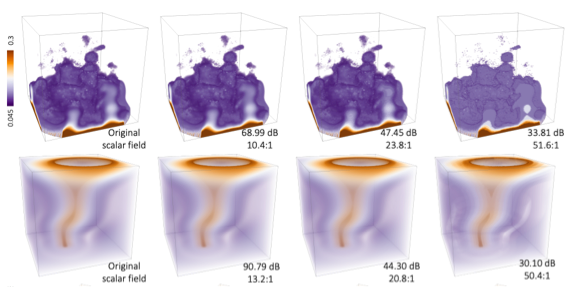
|
 TopoSZ: Preserving Topology in Error-Bounded Lossy Compression.
TopoSZ: Preserving Topology in Error-Bounded Lossy Compression.
Lin Yan, Xin Liang, Hanqi Guo, Bei Wang. IEEE Visualization Conference (IEEE VIS), 2023. IEEE Transactions on Visualization and Computer Graphics (TVCG), 30, pages 1302-1312, 2024. Supplementary Material. DOI:10.1109/TVCG.2023.3326920 arXiv:2304.11768. |
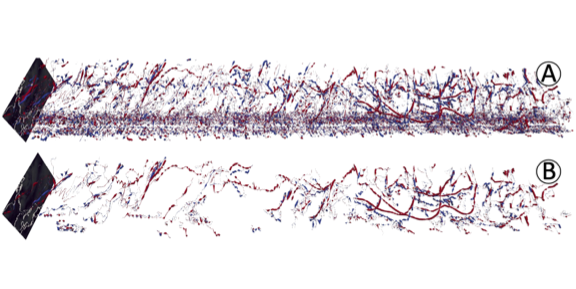
|
 TROPHY: A Topologically Robust Physics-Informed Tracking Framework for Tropical Cyclone.
TROPHY: A Topologically Robust Physics-Informed Tracking Framework for Tropical Cyclone.
Lin Yan, Hanqi Guo, Tom Peterka, Bei Wang, Jiali Wang. IEEE Visualization Conference (IEEE VIS), 2023. IEEE Transactions on Visualization and Computer Graphics (TVCG), 30, pages 1249-1259, 2024. Supplementary Material. DOI:10.1109/TVCG.2023.3326905 arXiv:2307.15243. |
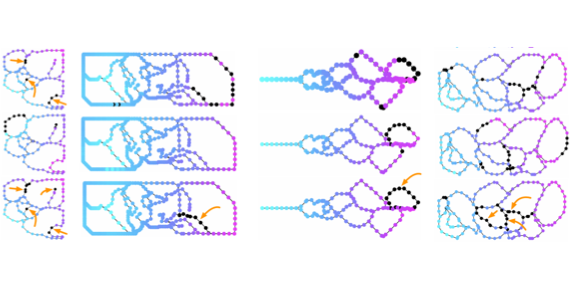
|
 Comparing Morse Complexes Using Optimal Transport:
An Experimental Study.
Comparing Morse Complexes Using Optimal Transport:
An Experimental Study.
Mingzhe Li, Carson Storm, Austin Yang Li, Tom Needham, Bei Wang. IEEE Visualization and Visual Analytics (VIS) Short Paper, pages 41-45, 2023. Supplementary Material. DOI:10.1109/VIS54172.2023.00017 |
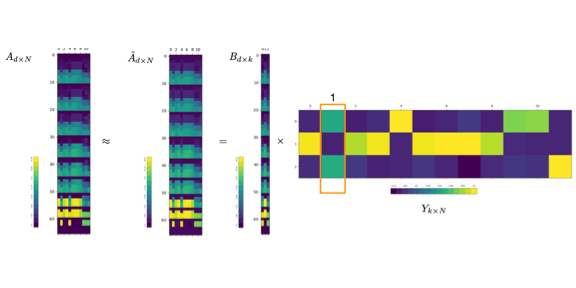
|
 Sketching Merge Trees for Scientific Visualization.
Sketching Merge Trees for Scientific Visualization.
Mingzhe Li, Sourabh Palande, Lin Yan, Bei Wang. IEEE Workshop on Topological Data Analysis and Visualization (TopoInVis) at IEEE VIS, pages 61-71, 2023. Supplementary Material. DOI:10.1109/TopoInVis60193.2023.00013 arXiv:2101.03196. |
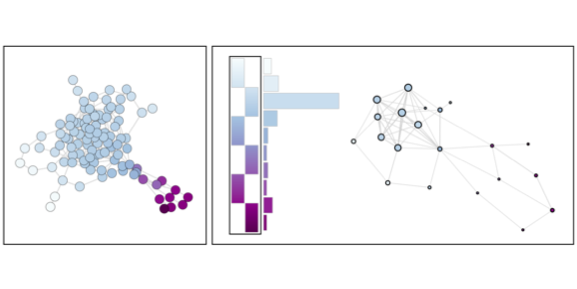
|
 Homology-Preserving Multi-Scale Graph Skeletonization Using Mapper on Graphs.
Homology-Preserving Multi-Scale Graph Skeletonization Using Mapper on Graphs.Mustafa Hajij, Bei Wang, Paul Rosen. IEEE Workshop on Topological Data Analysis and Visualization (TopoInVis) at IEEE VIS, pages 10-20, 2023. Supplementary Material: User study data. DOI:10.1109/TopoInVis60193.2023.00008 arXiv:1804.11242. |
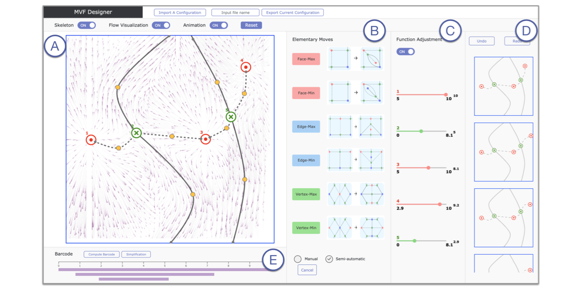
|
 Combinatorial Exploration of Morse-Smale Functions on the Sphere via Interactive Visualization.
Combinatorial Exploration of Morse-Smale Functions on the Sphere via Interactive Visualization.Youjia Zhou, Janis Lazovskis, Michael J. Catanzaro, Matthew Zabka, Bei Wang. IEEE Workshop on Topological Data Analysis and Visualization (TopoInVis) at IEEE VIS, pages 51-60, 2023. DOI:10.1109/TopoInVis60193.2023.00012 arXiv:1912.09580. |
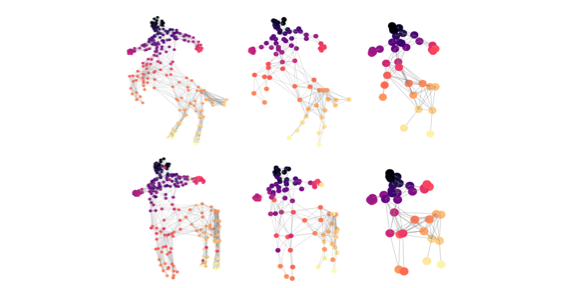
|
 Hypergraph Co-Optimal Transport: Metric and Categorical Properties.
Hypergraph Co-Optimal Transport: Metric and Categorical Properties.
Samir Chowdhury, Tom Needham, Ethan Semrad, Bei Wang, Youjia Zhou. Journal of Applied and Computational Topology, 2023. DOI:10.1007/s41468-023-00142-9 arXiv:2112.03904 |
| Year 3 (2022 - 2023) | |
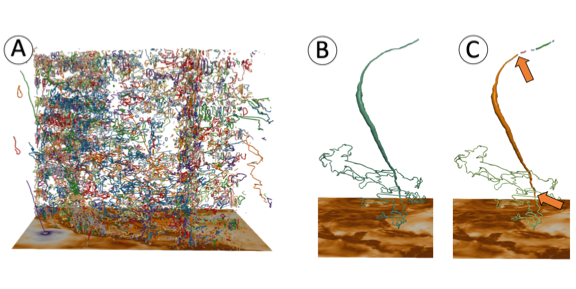
|
 Multilevel Robustness for 2D Vector Field Feature Tracking, Selection, and Comparison.
Lin Yan, Paul Aaron Ullrich, Luke P. Van Roekel, Bei Wang, Hanqi Guo.
Multilevel Robustness for 2D Vector Field Feature Tracking, Selection, and Comparison.
Lin Yan, Paul Aaron Ullrich, Luke P. Van Roekel, Bei Wang, Hanqi Guo.Computer Graphics Forum, 42(6), e14799, 2023. DOI: 10.1111/cgf.14799 arXiv:2209.11708 |
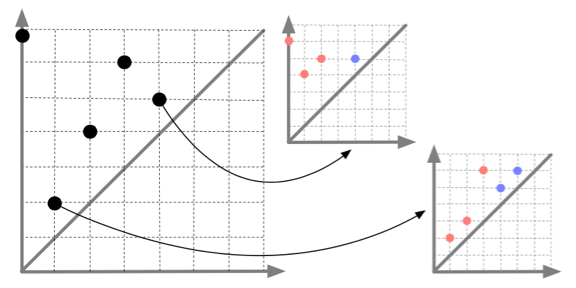
|
 Meta-diagrams for 2-parameter persistence.
Nate Clause, Tamal K. Dey, Facundo Mémoli, Bei Wang*.
Meta-diagrams for 2-parameter persistence.
Nate Clause, Tamal K. Dey, Facundo Mémoli, Bei Wang*.
International Symposium on Computational Geometry (SOCG), 2023. DOI:10.4230/LIPIcs.SoCG.2023.25 |
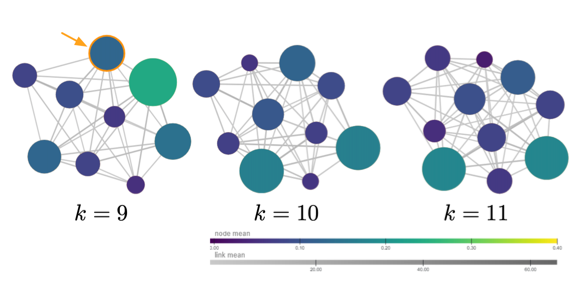
|
 Uncertainty Visualization for Graph Coarsening.
Uncertainty Visualization for Graph Coarsening.Fangfei Lan, Sourabh Palande, Michael Young, Bei Wang. IEEE International Conference on Big Data (IEEE BigData), 2022. DOI: 10.1109/BigData55660.2022.10021039 |
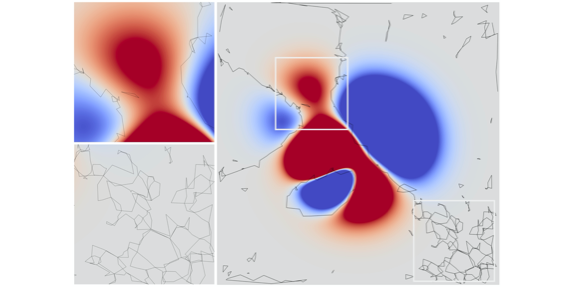
|
 Reduced Connectivity for Local Bilinear Jacobi Sets.
Reduced Connectivity for Local Bilinear Jacobi Sets.
Daniel Klötzl, Tim Krake, Youjia Zhou, Jonathan Stober, Kathrin Schulte, Ingrid Hotz, Bei Wang, Daniel Weiskopf. IEEE Workshop on Topological Data Analysis and Visualization (TopoInVis) at IEEE VIS, 2022. DOI: 10.1109/TopoInVis57755.2022.00011 arXiv:2208.07148 Honorable Mention Paper Award. |
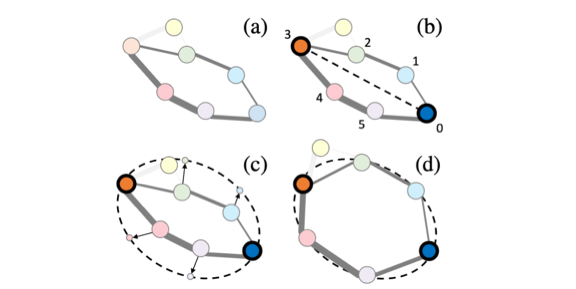
|
 Untangling Force-Directed Layouts Using Persistent Homology.
Untangling Force-Directed Layouts Using Persistent Homology.
Bhavana Doppalapudi, Bei Wang, Paul Rosen. IEEE Workshop on Topological Data Analysis and Visualization (TopoInVis) at IEEE VIS, 2022. DOI: 10.1109/TopoInVis57755.2022.00015 arXiv:2208.06927 |
| Year 2 (2021 - 2022) | |
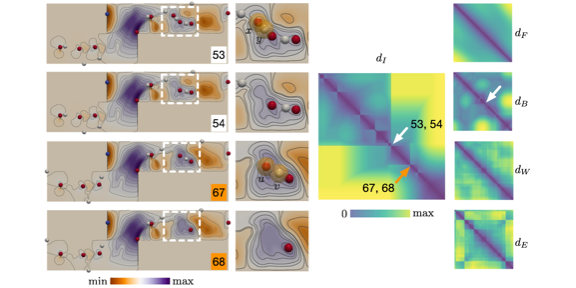
|
 Geometry-Aware Merge Tree Comparisons for Time-Varying Data with Interleaving Distances.
Geometry-Aware Merge Tree Comparisons for Time-Varying Data with Interleaving Distances.
Lin Yan, Talha Bin Masood, Farhan Rasheed, Ingrid Hotz, Bei Wang. IEEE Transactions on Visualization and Computer Graphics (TVCG), 29(8), pages 3489-3506, 2023. DOI: 10.1109/TVCG.2022.3163349 arXiv:2107.14373 |
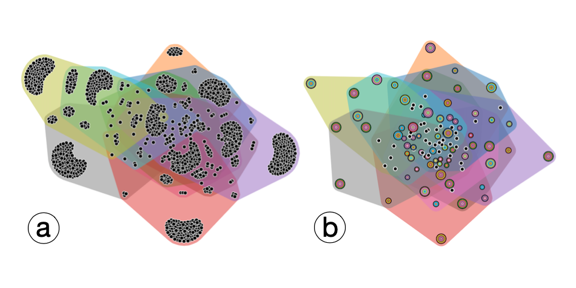
|
 Topological Simplifications of Hypergraphs.
Topological Simplifications of Hypergraphs.
Youjia Zhou, Archit Rathore, Emilie Purvine, Bei Wang. IEEE Transactions on Visualization and Computer Graphics (TVCG), 29(7), pages 3209-3225, 2023. DOI: 10.1109/TVCG.2022.3153895 arXiv:2104.11214. |
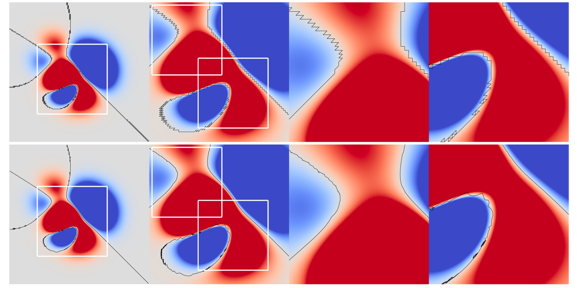
|
 Local Bilinear Computation of Jacobi Sets
Local Bilinear Computation of Jacobi SetsDaniel Klötzl, Tim Krake, Youjia Zhou, Ingrid Hotz, Bei Wang, Daniel Weiskopf. Computer Graphics International (CGI), 2022. Visual Computer, 38, pages 3435-3448, 2022. DOI: 10.1007/s00371-022-02557-4 Visual Computer Second Best Paper Award. |
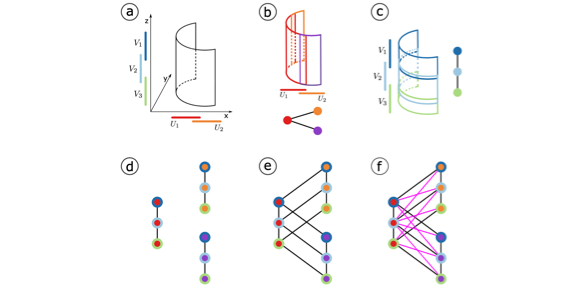
|
 Stitch Fix for Mapper and Topological Gains.
Stitch Fix for Mapper and Topological Gains.
Youjia Zhou, Nathaniel Saul, Ilkin Safarli, Bala Krishnamoorthy, Bei Wang. Research in Computational Topology 2, Association for Women in Mathematics Series, vol 30, pages 265-294, Springer, Cham. 2022. Editors: Ellen Gasparovic, Vanessa Robins, Katharine Turner. DOI: 10.1007/978-3-030-95519-9_12 |
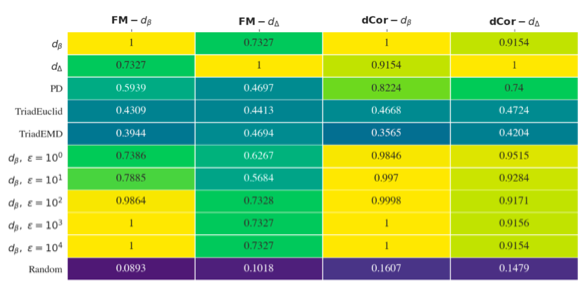
|
 Graph Pseudometrics from a Topological Point of View.
Graph Pseudometrics from a Topological Point of View.
Ana Lucia Garcia-Pulido, Kathryn Hess, Jane Tan, Katharine Turner, Bei Wang, Naya Yerolemou. Research in Computational Topology 2, Association for Women in Mathematics Series, vol 30, pages 99-128, Springer, Cham. 2022. Editors: Ellen Gasparovic, Vanessa Robins, Katharine Turner. DOI: 10.1007/978-3-030-95519-9_5 |
| Year 1 (2020 - 2021) | |
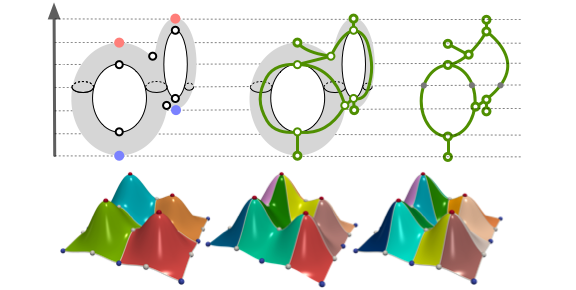
|
 Scalar Field Comparison with Topological Descriptors: Properties and Applications for Scientific Visualization.
Scalar Field Comparison with Topological Descriptors: Properties and Applications for Scientific Visualization.
Lin Yan, Talha Bin Masood, Raghavendra Sridharamurthy, Farhan Rasheed, Vijay Natarajan, Ingrid Hotz, Bei Wang. Eurographics Conference on Visualization (EuroVis), 2021. Computer Graphics Forum, 40(3), pages 599-633, 2021. DOI: 10.1111/cgf.14331 |
|
|
|
Software Downloads |
|
|
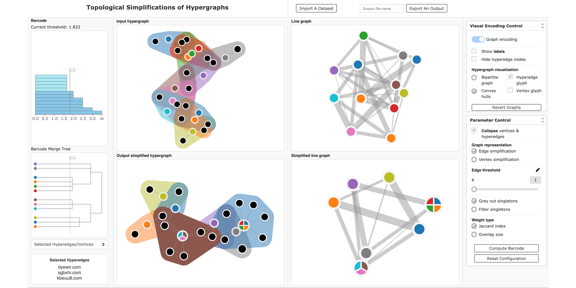
|
Topological Simplification of Hypergraphs https://github.com/tdavislab/Hypergraph-Vis An interactive toolbox for interactive visualization of hypergraphs and their simplifications. |
|
|
|
Presentations, Educational Development and Broader Impacts |
|
|
| Year 4 (2023 - 2024) |
|
| Year 3 (2022 - 2023) |
|
| Year 2 (2021 - 2022) |
|
| Year 1 (2020 - 2021) |
|
|
|
|
Postdoc and Students |
|
|
|
Mingzhe Li (Ph.D. student) School of Computing and Scientific Computing and Imaging Institute University of Utah Fangfei Lan (Ph.D. student) School of Computing and Scientific Computing and Imaging Institute University of Utah Dr. Raghavendra Sridharamurthy (Postdoc, April 2023 - March 2024) School of Computing and Scientific Computing and Imaging Institute University of Utah Dr. Salman Parsa (Postdoc, January 2022 - August 2022) Scientific Computing and Imaging Institute University of Utah |
|
|
|
Collaborators |
|
|
|
Dr. Pania Newell, Assistant Professor, Department of Mechanical Engineering; University of Utah. Dr. Anastasia Ilgen, Sandia National Lab. Dr. Roxana Bujack, Los Alamos National Laboratory. Dr. Emilie Purvine, Pacific Northwest National Laboratory. Dr. Gunther Weber, Lawrence Berkeley National Laboratory. |
|
|
|
Acknowledgement |
|
|
|
This material is based upon work supported or partially supported by the United States Department of Energy (DOE) under Grant No. DE-SC0021015. |
|
|